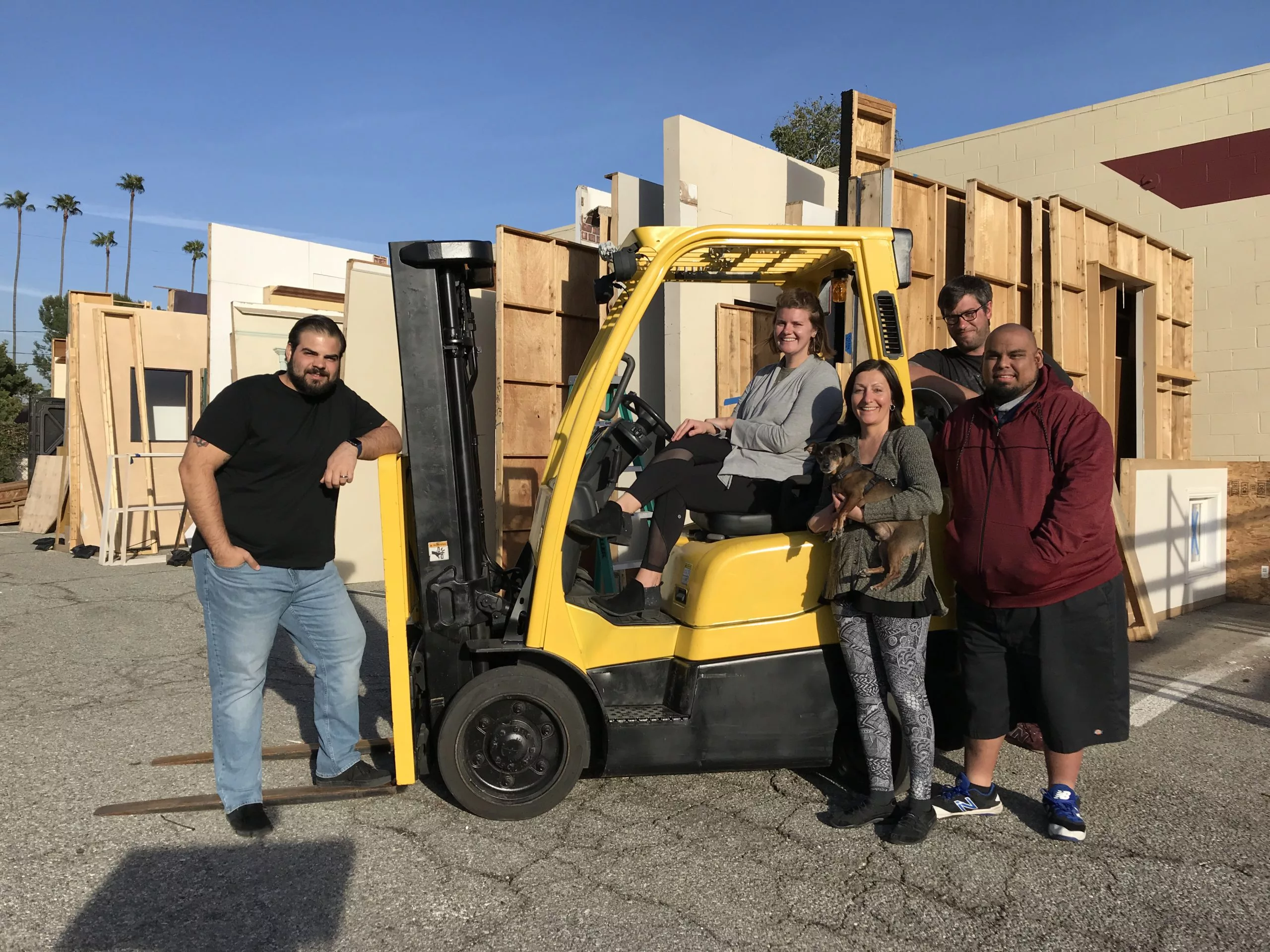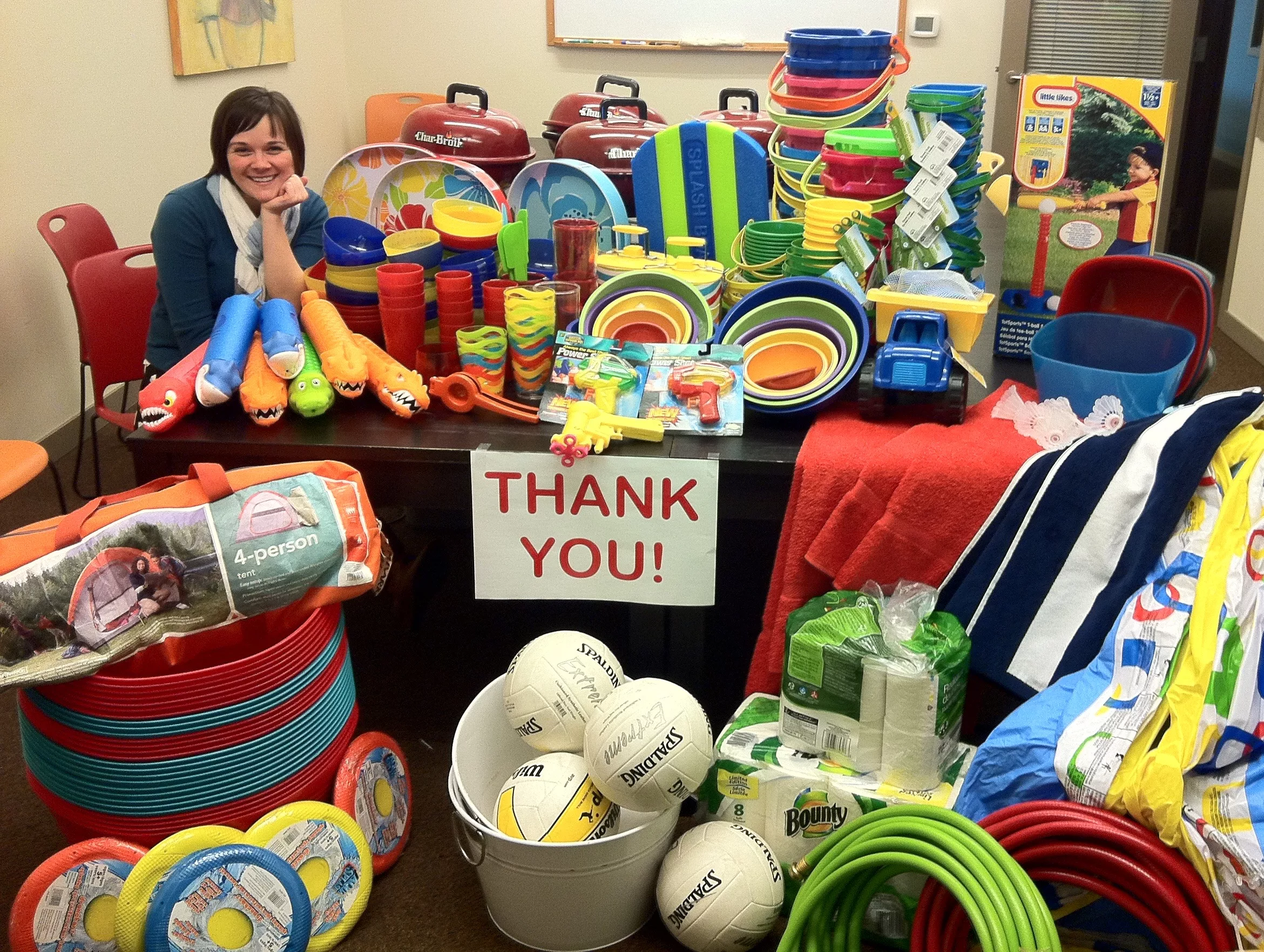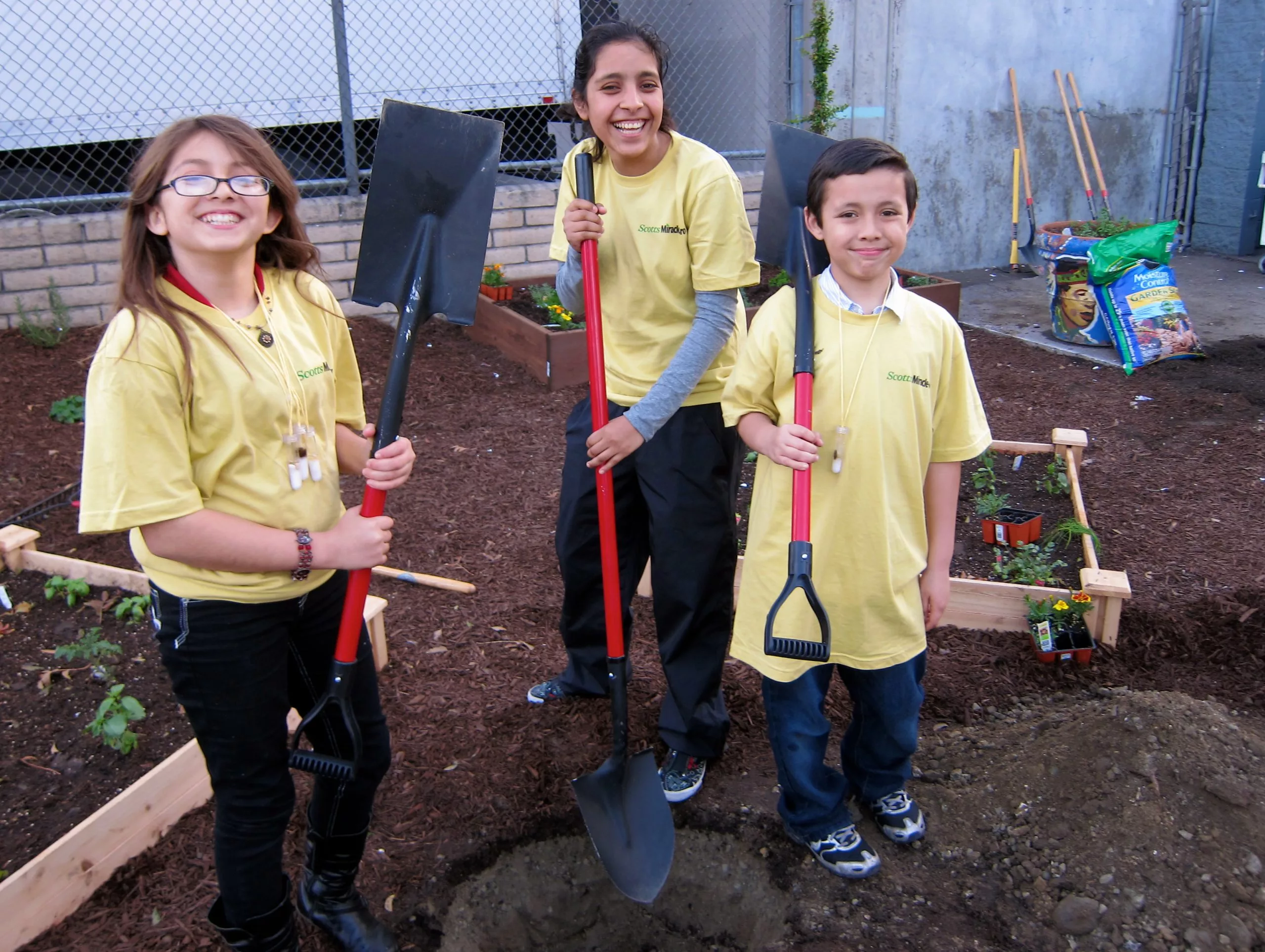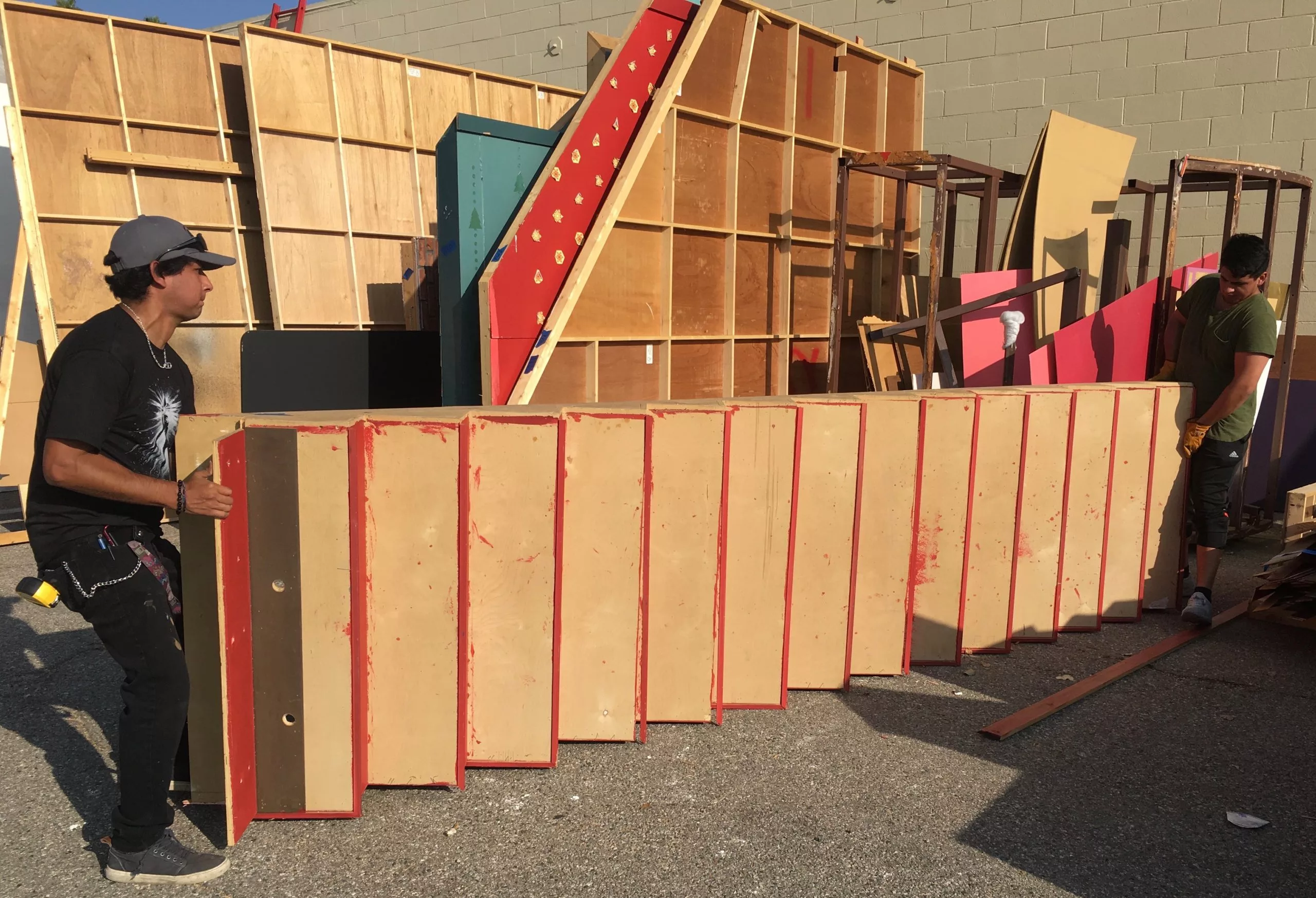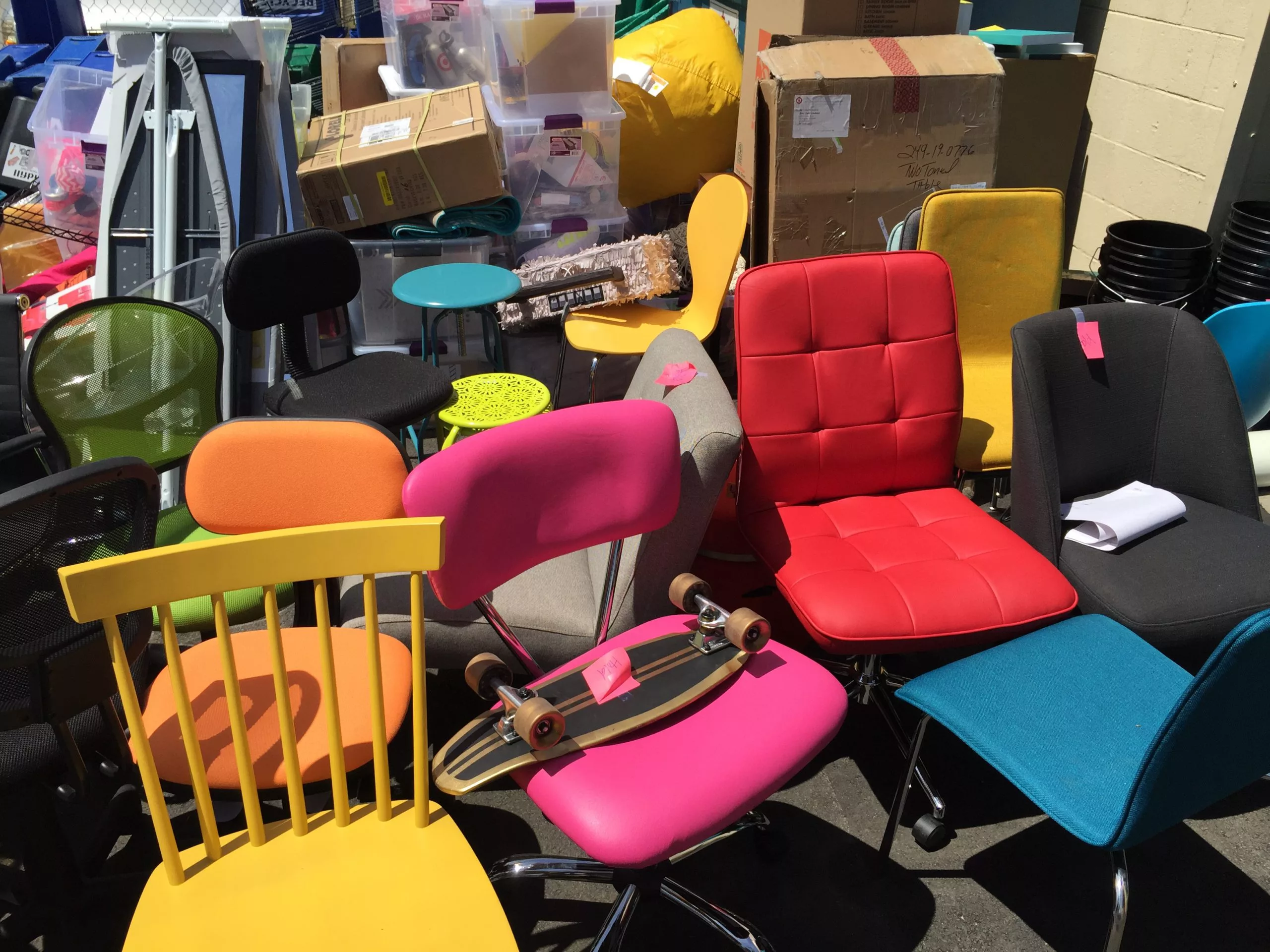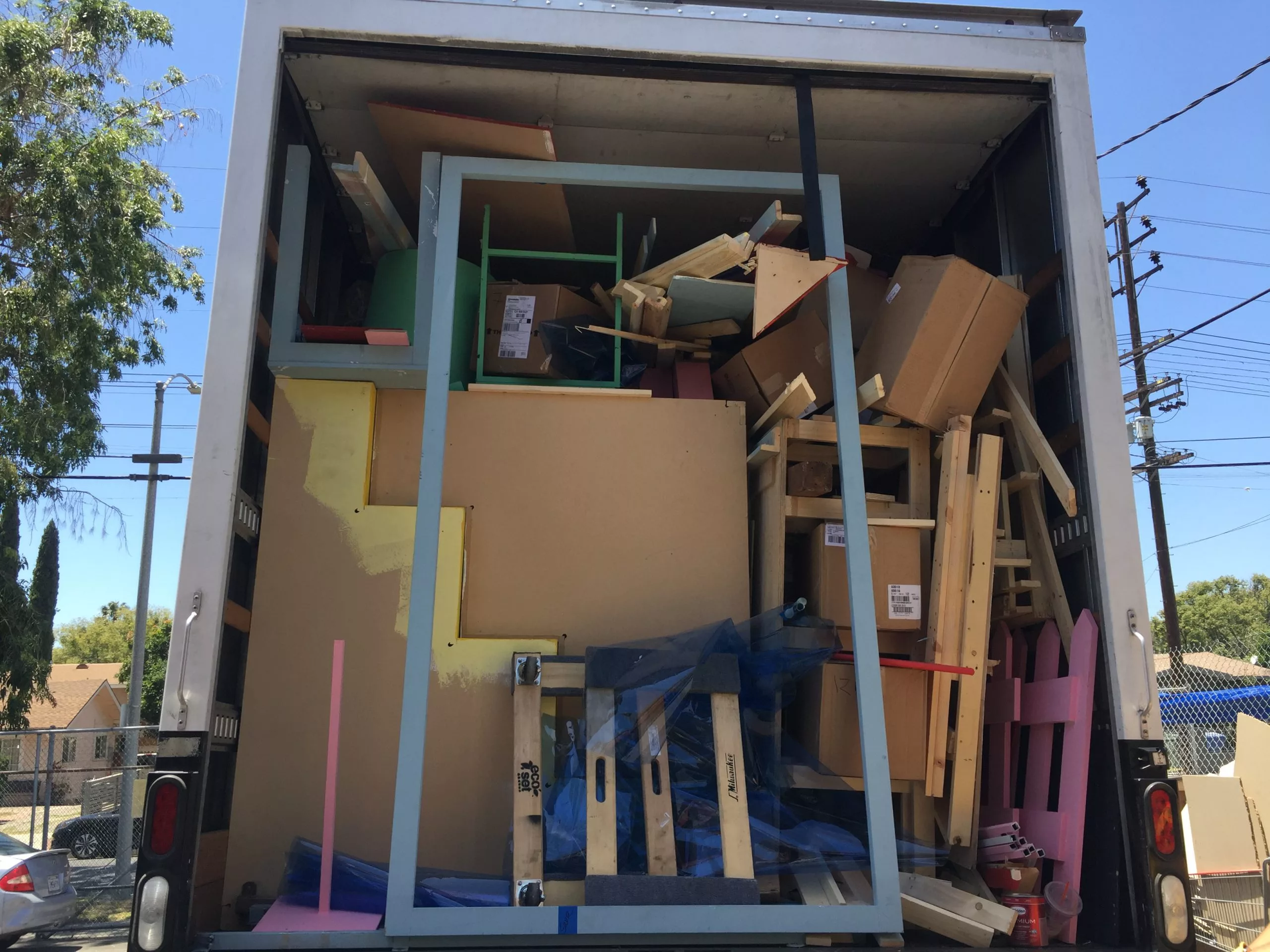There’s no business like show business — but it turns out that glossy exterior has a behind-the-scenes dark side: waste. Advertising productions, film sets, and marketing events usually operate with incentives that makes dumping props, sets, and equipment in a landfill easier and seemingly cheaper than figuring out how to reuse or recycle them. Enter EcoSet Consulting, a woman-owned and led small business based in Los Angeles.
The premise of EcoSet is simple: With EcoSet ReDirect, plus advance planning and budgeting, any production can achieve a better, more sustainable behind the scenes. And since 2014, students from UCLA and USC film studies programs can pick up free materials from the Materials Oasis, where local teachers, theaters, artists, and event planners also find what they need for their next project. To date, the Materials Oasis has catalyzed the reuse of more than 145 tons of discarded material. EcoSet has also partnered with over 1,000 families and non-profit groups — including social services, transitional housing, addiction recovery, veteran services, education, literacy, and programs supporting youth, women, and girls — to donate more than $2 million dollars in school supplies, clothing, home goods, furniture, decor, art supplies, and other reusable items.
We sat down with executive director Kris Barberg — one of the 2017 recipients of theEILEEN FISHER Woman-Owned Business Grant Program — to learn about how she’s building and scaling a social enterprise that’s transforming the film and media industries, and challenging us to rethink our approach to waste.
How did you get here?
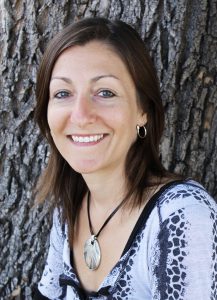
Kris Barberg is executive director of EcoSet
I started out as a storyteller making my own short films and documentaries. I met Shannon Bart, who’d soon become the founder of Ecoset, working on a short film shoot in 2005 in Minneapolis. I remember the moment clearly. I was the camera assistant and Shannon was a grip. I saw this bad ass woman with dreadlocks walk by on set wearing a tool belt and carrying a large light fixture that had to weigh as much as she did. I sat by her at lunch with the intention of roping her into working on a new short film with me. We became friends and collaborated on several projects after that.
By early 2008, we had both moved to LA and were freelancing on commercials. Shannon had been disheartened for years by the wastefulness of the film industry, and was pondering how to solve it. The opportunity came that summer, when we were both back to Minneapolis working on a feature film with the Coen brothers. Shannon, who was the production secretary, pitched the studio on a plan to implement sustainability into the six-month production schedule. That included things like eliminating plastic water bottles on set, comprehensive recycling and composting in all work spaces, and donating surplus production materials and sets during wrap. At the end of the show, office supplies and furniture were disbursed to local schools and non-profits in the Twin Cities, and high quality sets and construction materials from the movie went on to be reused by independent filmmakers rather than enter the waste stream. That became the foundation for EcoSet and we launched in 2009.
How were you drawn to EcoSet, and how did you previous work provide you with unique insight?
Coming from a scrappy DIY film market like Minneapolis, I was armed with the ability to problem-solve and do more on a tight budget. I brought with me knowledge of how the production process works from prep to wrap, how budgets work, how to prioritize hundreds of tasks, and the ability to endure a 12- to 18-hour work day. Once I started working on high-budget projects like feature films and multi-million-dollar commercials, I became aware of how much money gets spent to make something happen quickly, and then just as quickly, it’s made to go away. That’s the intersection that led me to join forces with EcoSet, applying a knowledge of the production process to creating a better behind-the-scenes and providing an alternative to traditional waste disposal.
Shortly after founding the company, Shannon started working directly with Target Corporation’s marketing team to create a Zero Waste process for their commercial shoots in Los Angeles. A month or so later, she was offered a position at a major motion picture studio to develop a sustainable production program for their features and television shows. That’s when I stepped out of freelancing to lead EcoSet and develop our services in Los Angeles, New York, Minneapolis, and other production markets across the US. Fast forward nearly a decade later, and Shannon is still with the studio. Meanwhile, at EcoSet, we’re about to embark on a major expansion that will allow us to reduce even more waste in the entertainment industry and provide resources to more schools, non-profits, theaters, filmmakers, artists, and makers who rely on us for free materials.
How does it work?
There are three main reasons productions and events don’t plan and budget for reuse. First, it takes time to matchmake the surplus to needs. Second, there’s a need for logistics to get materials from point A to point B. And third, we need space to land materials in the interim until they can be donated. For most productions, it’s simpler, cheaper, and more expedient to dispose of everything in landfills. But if you partner with us, we take care of the heavy lifting. In reality, very little needs to go to a landfill. When there’s a plan in place, it’s not waste.
It’s easy to recirculate high value items: wardrobe, props, set dressing, furniture, decor, and such. For furniture and home goods, we prioritize traditional housing and non-profits that provide poverty relief sources for the community. For school supplies and art materials, we prioritize schools and educational enrichment programs. The hard part is the sets. On one recent TV show, we diverted 31 tons, finding new homes for a jail cell, warehouse, catwalk, brick alley, record shop and other non-standard environments. We recirculate construction materials and discarded creative elements like flooring and backdrops, as well as non-recyclable materials like MDF wood, acrylic and other plastics, foam, and custom-built elements like platforms, counters, a staircase that goes nowhere and cabinets that don’t open. The teachers who come through our Materials Oasis tell us that their arts education funding has been cut, they sometimes need to buy art supplies out of pocket for their classes. As part of our course of business, we get to lavish free resources on the hard-working educators and innovative artists in our community. We think of ourselves as a “resource Robinhood,” collecting surplus materials that large budget productions do not want, and being the bridge to creators and educators who truly need and value them, even in scrap form.
- Home goods can go to nonprofits
- Garden tools can go to schools
- Film students are able to get free sets
- Some of the set dressings that EcoSet has rescued
- A full truck of salvaged materials
Describe the greatest challenge of this work, and what inspires you.
In film and television production, there’s no standard line item for “do the right thing.” Working with advertising clients and TV shows, we’re often dealing with a restricted disposal budget, a short wrap-out schedule, and cheap disposal costs. It’s only pennies on the ton to dump the contents of a box truck or trailer at a landfill near LA. Deploying labor to destroy set pieces to fit into a dumpster can happen in the blink of an eye, and is much faster than embarking on a lengthy coordination process to find a home for everything that remains and paying for additional storage.
Our challenge is to be cost competitive, convenient, and a one-stop-shop. Many productions donate building materials and architectural supplies to Habitat for Humanity, and clothing and furniture to Goodwill, but these places can’t take custom props, signage, sculpted foam, fake snow, and other unwieldy items. EcoSet can take anything and everything. We specialize in random and non-recyclable materials. We’re encouraged by brands like Target that have stayed the course of sustainable production since 2009, and now include sustainability as standard operating procedures throughout their marketing business. Environmental mindfulness is part of their production process for commercials, experiential events, photo shoots, digital video shoots, and asset purges.
In the era of #MeToo, there are a lot of changes afoot within the worlds of film and advertising. How is supporting and empowering women a part of your day-to-day at EcoSet?
We’re proud to be a women-owned business that’s been certified by WBENC every year since 2013. In the sustainable production space, there are many women on the front lines doing the hard work and creating new standards. We make a point to support other women across the country and in Canada who are tackling similar impacts in the entertainment industry. We have sisters in Vancouver, New York, London and other places who we admire, share resources with, and subcontract whenever we can.
EcoSet has had a predominantly female staff since our inception, so we’ve been able to chart our own waters and define our style of leadership. Our representatives in New York, Minnesota, and the Southeast are women. The team we’ve built operates from a place of respect and empowerment and unwavering belief that everything is possible. Our reuse coordinator, Emily, keeps work gloves and steel-toed boots at her desk. One minute she’s making a deal on the phone to pick up a set, and the next minute she’s on the forklift helping a theater group load free materials into a U-Haul. All in a day’s work. Oh, and I can’t fail to mention: our new forklift is named Eileen (we purchased her with Eileen Fisher grant money in fall 2017).
How can we translate best practices learned from EcoSet to other businesses, or even to our personal lives, and become more waste-efficient?
Zero Waste is a standard that’s becoming more widely used by large cities, major corporations and manufacturers, schools, and institutions. It doesn’t mean that no waste was generated at all, but that it’s been effectively managed and measured — defined as 90 percent or greater diversion from landfill or incineration. This is an achievable goal, but only with planning and top down directives. Through our journey, we’ve learned that Zero Waste only works in the fast-paced, nomadic nature of production and events if it’s both top-down and bottom-up, and there needs to be a budget to achieve measurable results.
On a personal note, working with EcoSet taught me early on to examine everything that passes through my hands — and you can, too. In my home there are many different versions of diversion. There is the bin of produce scraps for my worms, the bin of food waste and soiled paper for industrial composting, can and bottle recycling, plastic and glass recycling, paper recycling, the reusable bags collection, the reusable water bottle and coffee mug collection, the donation pile, the list goes on.
To you, how does leading an impact-driven, socially-conscious business look different than focusing exclusively on the profit margin?
As a triple-bottom-line company, we were a little off-balance for the first several years, so focused on our mission and service development, plugging all spare earnings back into the company to hire more staff, and invest in infrastructure and equipment. We were more focused on simply existing and defining our vision than profitability. We opened our doors in the depths of a recession, and there was no blueprint for what we were doing. It has always felt like we were drawing the map as we were driving. Now we feel like we’re hitting our stride by providing a service that is wanted and needed in the larger creative industry of LA, all the while creating a positive community benefit. A rising tide lifts many boats. On top of that, we’re diverting waste from local landfills wherever we work, second-handedly aiding municipalities with waste diversion challenges.
After nine years of constant R&D and operating like a start-up, we finally feel like we’re in a safe place to explore what that third bottom line is all about. People? Check, Planet? Check, Profit? Let’s go for it! Our challenge is to emerge from being a small business just scratching out a living to becoming a household name. We plan to be the go-to resource for the creative industries in the entire City and County of Los Angeles, and beyond that, any city into which we endeavor to expand.
Can you share some tips for entrepreneurs who are just getting going in the conscious-company space? What are some of the experiences that set you up for success, and how might others learn from those?
(1) A formula I recommend is: Keep a loose grip on perfection and get used to spaghetti always on the walls.
(2) Commit to working outside your silo. By now, more sustainable business models exist to learn from all across the globe than ever before. Find mentors and collaborators. Join a working group to meet other subject-matter experts
(3) Let your employees lead. They are stakeholders, listen carefully to anyone working on the front lines of your work.
(4) Find your playground — that pilot project, area of research, or tool kit development — that lights you up and makes you excited about your ideas and investment. At one point on my journey, I realized that the words “reaction” and “creation” are spelled with same letters. It’s up to us to determine which space we operate from, simply reacting to obstacles in our path, or inventing an entirely new reality.
Looking ahead, what are you most excited about and why?
We’re beginning our 10th year as a company and it feels like everything we’ve experienced and worked hard for in the first nine years is starting to coalesce. For the last several years, we’ve been working out of a small building, and operating our Materials Oasis donation center out of a tiny warehouse and an outdoor parking lot, battling rain, wind, extreme SoCal heat, and other deterrents. In April 2018, we’re expanding from a 4,000-square-foot building to a 50,000-square-foot property including two large buildings, a yard, a parking lot, and workspace beyond our wildest dreams. We are ready to grow into a profitable solutions-based service provider, creating more jobs each year than the year before, providing living wages and advancement opportunities for our staff, partnering in workforce-development programs, lifting the arts, providing resources to non-profits and schools, all in a day’s work!
To date, the Materials Oasis has been a loss leader for us. It’s solely funded from our overhead costs and only open two days a week by appointment. In our new space, we will be able to add staff to host visitors every day of the week, moving even more mountains of material than we could previously due to an increased volume of work we are already experiencing. There’s a very giddy buzz around our office this week as I am about to sign the new lease. Our staff is beyond excited for the new space we are about to grow into and the adventures ahead of us as we explore our potential and profitability.
This article is part of a series featuring the 2017 winners of the EILEEN FISHER Woman-Owned Business Grant Program. Instilling confidence in women business owners is one of Eileen Fisher‘s personal passions, and since 2004 the grant program has supported innovative, women-owned companies that are beyond the start-up phase and ready to expand their business and their potential for positive social and environmental impact.
